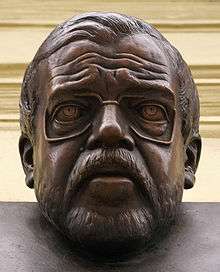Václav Benda

Václav Benda (August 8, 1946, Prague – June 2, 1999) was a Czech political activist and mathematician. Along with other dissidents in the 1960s and 1970s, Benda led the movement for greater political freedom and expression in the communist-dominated nation. His efforts were largely unsuccessful and led to constant harassment from authorities and social exclusion.
In 1977, the same year he became a signatory to Charter 77, the Czech dissident movement group, he wrote in "samizdat" (underground publishing) fashion, a short seminal tract called "Parallel Polis" (translated into English in 1978). The purpose of the essay was to inject new life into the country's moribund political life. In brief form, Parallel Polis was a philosophical call for his fellow dissidents to abandon hope that the repressed social, economic and political institutions in Czechoslovakia could be changed by protest.[1]
Instead, Benda urged that new "parallel institutions" be created that are more responsive to human needs and that may someday even supplant the existing corrupt ones. The entrenched communist state would simply drain any efforts at reform; better to start new ones than waste energy fighting old ones. At its core, Parallel Polis is an inherently communal concept that shares profound philosophical ties to the early Christian movement that developed shortly after the death of Jesus. Much of this religious influence might have been the result of his deep and intense devotion to his Catholic faith.[2]
The idea was a lightning rod in the dissident community and landed Benda in jail for years as a result.[3] Any notions of parallel institutions being created in Czechoslovakia were thus crushed. By the end of the 1980s and the coming of the Velvet Revolution that threw off communism, Parallel Polis as an idea vanished from the political scene. Only in recent years has it been revived, by a group of scholars at the University of Washington. In the Czech Republic its influence can be seen in a four story building called Parallel polis (paralelní polis), housing a bitcoin-only cafe, co-working space, makers lab, and "Institute of cryptoanarchy" in Holešovice.[4][5]
In 1989, Benda joined a Christian right-wing political party, Christian Democratic Party, which later merged with the Civic Democratic Party. He increasingly became a controversial figure within Czech society, and his politics roiled his former dissident comrades and may have isolated him politically.
From June 25 to December 31, 1992, Benda was Chairman of the Chamber of the Nations.
The mid-1990s found him in charge of the Bureau for Investigating the Crimes of Communist Party officials. He took the role seriously and worked tirelessly, but judicial resistance and lack of governmental cooperation forced Benda to try criminals in the court of public opinion using the media.
He sided with former Chilean dictator Augusto Pinochet. In 1996, he was elected as senator to the Czech Parliament in district Prague 1, a seat he held until his sudden death in 1999.
Notes
- ↑ "Vaclav Benda". Encyclopædia Britannica.
- ↑ Bourdeaux, Michael (22 June 1999). "Vaclav Benda". The Guardian. Retrieved 8 October 2015.
- ↑ "Computer professionals whose scientific freedom and human rights have been violated—1984: A report of the ACM Committee on Scientific Freedom and Human Rights." Communications of the ACM. vol. 28, no. 1. January 1985.
- ↑ Cuthbertson, Anthony (2014-11-03). "World's First #Bitcoin Only Café Launches in Prague @Paralelni_polis #hackers". International Business Times UK. Retrieved 2016-11-30.
- ↑ Ševčík, Pavel. "Paralelni Polis - Paralelní Polis - Paralelní Polis". www.paralelnipolis.cz. Retrieved 2016-11-30.